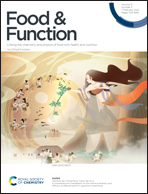Cytochrome P450 epoxygenase-derived EPA and DHA oxylipins 17,18-epoxyeicosatetraenoic acid and 19,20-epoxydocosapentaenoic acid promote BAT thermogenesis and WAT browning through the GPR120-AMPKα signaling pathway
Abstract
The mechanisms whereby fish oil rich in EPA and DHA promotes BAT thermogenesis and WAT browning are not fully understood. Thus, this study aimed to investigate the effects of cytochrome P450 (CYP) epoxygenase-derived EPA and DHA oxylipins 17,18-EpETE and 19,20-EpDPE on BAT thermogenesis and WAT browning and explore the underlying mechanism. Stromal vascular cells (SVCs) were subjected to 17,18-EpETE or 19,20-EpDPE treatment and mice were treated with the CYP epoxygenase inhibitor, the thermogenic marker genes were detected and the involvement of GPR120 and AMPKα were assessed. The in vitro results indicated that 17,18-EpETE and 19,20-EpDPE induced brown and beige adipocyte thermogenesis, with increased expression of thermogenic marker gene UCP1 in differentiated SVCs. Meanwhile, the expression of GPR120 and phosphorylation of AMPKα were increased in response to these two oxylipins. However, the inhibition of GPR120 and AMPKα inhibited the promotion of adipocyte thermogenesis. In addition, in the presence of CYP epoxygenase inhibitor MS-PPOH, EPA and DHA had no effect on increasing UCP1 expression in differentiated SVCs. Consistent with the in vitro results, the in vivo findings demonstrated that fish oil had no body fat-lowering effects and no effects on enhancing energy metabolism, iBAT thermogenesis and iWAT browning in mice fed HFD after intraperitoneal injection of CYP epoxygenase inhibitor SKF-525A. Moreover, fish oil had no effect on the elevation of GPR120 expression and activation of AMPKα in iBAT and iWAT in mice fed HFD after intraperitoneal injection of SKF-525A. In summary, our results showed that CYP epoxygenase-derived EPA and DHA oxylipins 17,18-EpETE and 19,20-EpDPE promoted BAT thermogenesis and WAT browning through the GPR120-AMPKα signaling pathway, which might contribute to the thermogenic and anti-obesity effects of fish oil.



 Please wait while we load your content...
Please wait while we load your content...